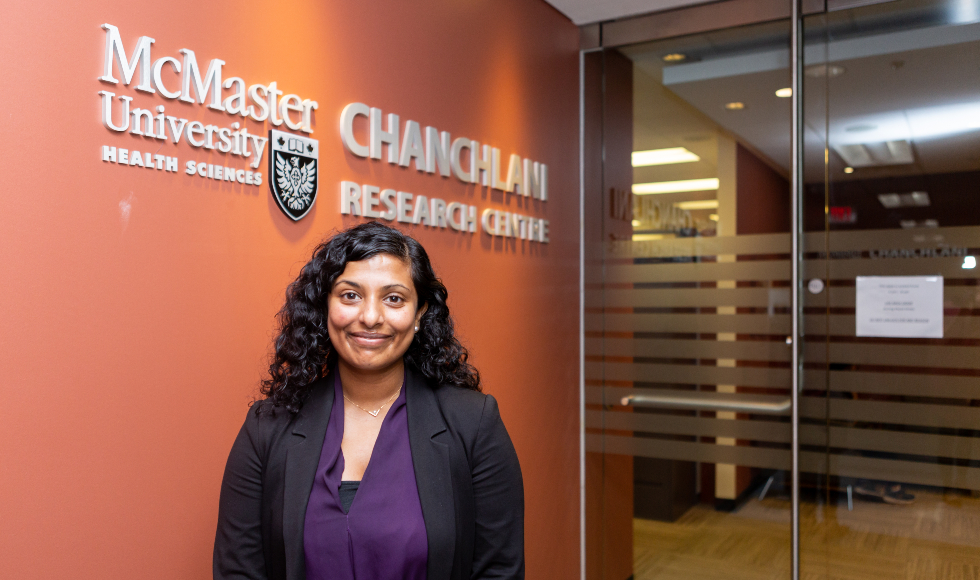Meet Vanier Scholar Sujane Kandasamy

Photo credit: Sarah Janes
BY Sara Laux
September 7, 2018
Sujane Kandasamy is a PhD student in the Health Research Methods, Evidence and Impact program in McMaster’s Faculty of Health Sciences. She’s also one of 10 McMaster recipients of a Vanier Canada Graduate Scholarship.
Kandasamy completed undergraduate degrees in both science and anthropology at McMaster, and completed a master’s degree in Health Research Methodology at Mac as well. She’s currently working with Sonia Anand in the area of knowledge translation, working with South Asian and Indigenous women to address health concerns during pregnancy.
Kandasamy talks about her research, her very first research project, and why she’s so passionate about science and health communication.
On her research
My research is focused on knowledge translation, which essentially means taking findings from research and making it available to people and organizations who can put it to practical use. Right now, I’m working on finding the most effective ways to communicate information about gestational diabetes for South Asian communities (women, families and primary care providers) and perinatal health knowledge for Indigenous populations (women, families and midwives).
I’m working with two birth cohort studies that are led by my supervisor, Sonia Anand: the South Asian Birth Cohort (START) and the Aboriginal Birth Cohort (ABC), to develop tools that will address knowledge gaps in a way that’s equitable, sustainable, useful and wanted or needed. By making information available based on best practices and according to what these cohorts want and need, we hope to find a targeted way to reduce conditions like gestational diabetes.
We’ve identified that some of the risks can be higher in these two communities, specifically for cardiovascular disease, and these populations are also growing in a Canadian context. The earlier we intervene the more we can do.
Based on a formative qualitative study and literature review on knowledge translation interventions with pregnant South Asian women, I’ve started to develop a toolkit that can be distributed by a healthcare provider early in pregnancy. It takes complicated information and makes it easy to understand, and addresses the needs of women and gives them what they want to know. I aim to test the impact of this toolkit with women and their care providers.
I’m also in the initial stages of working with our partners at Six Nations to develop behaviour change communications tools, that might be used by midwives in a birthing centre, for example.
On her very first research project
My first exposure to a research project was in Grade 5. It was called the PRIME Mentors program – one student from each class was selected to be part of the program, and instead of going to our regular science class, we would work one-on-one with an established community member to do a project of our interest.
At that point I was super interested in Isaac Newton and the falling apple. My mentor, Helen, worked with me to do a project on Isaac Newton and the history of gravity and its discovery. You can never be too young to be curious and explore in a formalized way.
On what inspired her to do what she’s doing now
I’ve always been interested in research in some form. I actually ended up doing two undergraduate degrees – a BSc in biology and a BA in anthropology. I started looking for ways to combine and cultivate the space between the two.
I also worked as a medical interpreter for people who spoke Tamil, and that was my first exposure to communicating really difficult things to laypeople, and how important – and complicated – that can be. People’s decisions depended on them having the right information.
While it’s important to complete journal publications or posters, I don’t feel like that’s enough. I’m inspired to think outside those traditional ways of translating information to more innovative and equitable ways to share the knowledge.
On an ongoing project that’s dear to her heart
In 2010 a colleague from McMaster and I co-founded The Starfish Canada, a non-profit organization where we work virtually and hands-on with youth across Canada on environmental issues. We have a website where we have youth writers publishing pieces on environmental subjects that often aren’t in the limelight. We also have a series called Sketchy Science which is a comic series about environmental issues drawn by one of our volunteers. We also work hands-on with students, youth and Let’s Talk Science to do hands-on inquiry- and solutions-based projects across the country.
On why science communication is important
We’re really missing out on the impact of research if we’re not able to communicate effectively. We could spend years and years researching it, but if only I know about it, and only I can understand it, then its true value is lost. The information is out there, and sharing inspires conversations and strengthens dialogue.
The Vanier Canada Graduate Scholarships are the Government of Canada’s most prestigious awards for doctoral students. The program provides $50,000 per year for up to three years to students who demonstrate academic excellence, research potential and leadership ability. Up to 166 awards are distributed each year by three federal granting agencies: the Canadian Institutes of Health Research (CIHR), the Natural Sciences and Engineering Research Council (NSERC) and the Social Sciences and Humanities Research Council (SSHRC). This year, 10 McMaster students received Vanier scholarships.


